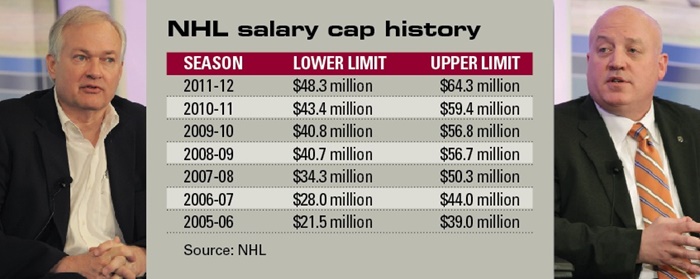One year out from the expiration of the NHL’s collective-bargaining agreement, there’s both optimism and uncertainty among the two sides that will be looking to reach a deal.
The NHL, for its part, met with club general managers this summer in a number of individual meetings and CBA workshop settings to talk about what improvements they wanted in a new labor deal, according to NHL Deputy Commissioner Bill Daly.
The league’s current labor pact expires one year from Thursday — on Sept. 15, 2012.
“We are prepared to engage in substantive collective bargaining negotiations whenever the Union tells us it is ready,” said Daly via email to SportsBusiness Journal. “For the record, I do not expect this to be either a particularly contentious, or prolonged negotiation.”
Daly said the NHL will not be seeking to overhaul the league’s current economic system — as it did in 2004, ultimately leading to a lockout that shut down an entire season — but he said the league will be seeking some changes, though he declined to specify any targets.
The NHL in 2004 was losing hundreds of millions of dollars. It now is a profitable league that has seen annual revenue increase. Said Daly, it is “a more stable and far more competitive League” than existed before the lockout.
With the growth in revenue, the salary cap for teams has gone up (see chart), something that has benefited the players.
Still, the question remains, What will the players do in this new round of negotiations?
“I have no comment on bargaining positions until they are finalized with the Executive Board and players,” said NHL Players Association Executive Director Don Fehr, in an emailed response to questions last week.
Fehr, the former head of the MLB Players Association, was elected by NHL players in December to lead their union.
Players were widely viewed as the losers in the 2004-05 NHL lockout after they agreed to an entirely new system proposed by the owners, one that includes a salary cap that features an escrow system for player salaries. The league holds a portion of players’ salaries in escrow until the end of the year, allowing the NHL to give players an exact percentage of leaguewide revenue. Last season, players received 57 percent.
Since its inception, players have hated the escrow system. Asked about that, Fehr wrote, “Players have certainly expressed discontent with the existing escrow provisions, which, more often than not, result in players not receiving the face value of their contracts.” Fehr would not, however, say whether the players would seek to eliminate the escrow or even whether the current CBA was working for players. “The NHLPA is in the process of continuing to review the operation of the current CBA with the Players, and I have no specific comment at this time,” he said.
Fehr this summer held a series of meetings with players, including executive board meetings in both Canada and Chicago, and he has conducted numerous individual meetings with groups of players, some as small as five players, in cities all over North America and Europe. “The purpose of these meetings is to both conduct ongoing business, and discuss current issues, but also to continue the process of preparation for bargaining,” Fehr wrote, in his email. “Discussion of bargaining issues did, of course, take place.”
Since the lockout ended in 2005, NHL players have fired three executive directors — Bob Goodenow, Ted Saskin and Paul Kelly — and a fourth interim executive director, Ian Penny, quit. Stories of division among players, agents and NHLPA staff have been common over the last several years.
Said one agent, “Don has done a remarkable job in a very short period of time. He has coalesced support by reaching out to players and meeting with them in small groups and bringing unity and cohesion to a group that was as divided and chaotic as any union has ever been.”
Agents and other players-side sources asked for anonymity because they were not authorized to speak publicly on the union’s position.
Both Daly and Fehr said they expect to begin formal negotiations for a new CBA this coming winter.
 |
GORT PRODUCTIONS (2)
Fehr (left) is mum on bargaining positions; Daly says he doesn’t expect contentious talks. |




